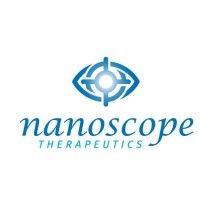Nanoscope Therapeutics, Inc.

🇺🇸United States
- Country
- 🇺🇸United States
- Ownership
- Private
- Established
- 2017-01-01
- Employees
- 11
- Market Cap
- -
Nanoscope's Optogenetic Gene Therapy Shows Promise in Retinitis Pigmentosa Clinical Trials
• Nanoscope Therapeutics' MCO-010 gene therapy demonstrated clinically meaningful vision improvements in 16 out of 18 patients with severe retinitis pigmentosa in a Phase 2 trial, compared to only four of nine in the placebo group.
• The mutation-agnostic therapy uses a synthetic opsin (MCO protein) delivered via intravitreal injection to restore light-detecting function in damaged retinal cells, potentially benefiting patients regardless of their specific genetic mutation.
• Following treatment, patients showed significant improvements in vision-guided mobility and object recognition, with some experiencing "transformative" results while maintaining a favorable safety profile with no serious adverse events reported.
Nanoscope to Present 126-Week Vision Restoration Data for MCO-010 Gene Therapy in Retinitis Pigmentosa
• Nanoscope Therapeutics will present long-term follow-up data from the REMAIN study of MCO-010 optogenetic therapy for retinitis pigmentosa at two major ophthalmology meetings in February 2025.
• Dr. Allen Ho from Wills Eye Hospital will discuss 126-week efficacy and safety data at the Bascom Palmer Eye Institute's Angiogenesis Meeting, focusing on vision restoration outcomes in advanced RP patients.
• The company plans to initiate BLA submission for MCO-010 in Q1 2025 following positive Phase 2b RESTORE trial results, while also advancing trials for Stargardt disease treatment.
AAO 2024: Emerging Data in Retinal Therapies for Geographic Atrophy, Stargardt Disease, and Retinitis Pigmentosa
• Alkeus Pharmaceuticals will present results from clinical studies of oral gildeuretinol for geographic atrophy secondary to age-related macular degeneration (SAGA) and Stargardt disease (TEASE).
• Annexon will share new analyses of ANX007 from the Phase 2 ARCHER trial in geographic atrophy, highlighting clinical results and anatomical changes.
• Nanoscope Therapeutics is set to share topline data from the RESTORE trial of MCO-010 therapy in patients with severe vision loss due to retinitis pigmentosa (RP).
Nanoscope Therapeutics Enhances Vision Restoration Therapy with CatCh Technology License
• Nanoscope Therapeutics has licensed the CatCh technology from Max Planck Innovation to boost the light sensitivity of its MCO-010 gene therapy.
• MCO-010, a tri-protein fusion complex, targets inherited retinal degenerative diseases like retinitis pigmentosa and Stargardt disease, showing promise in clinical studies.
• The CatCh technology, integrated into MCO-010, enhances its light-activated properties, potentially improving vision restoration in various settings.
• Nanoscope is in discussions with the FDA to explore accelerated approval pathways for MCO-010, aiming to address unmet needs in severe retinal conditions.
Nanoscope Plans BLA Submission for MCO-010 Gene Therapy in Retinitis Pigmentosa
• Nanoscope Therapeutics plans to submit a Biologics License Application (BLA) to the FDA in Q1 2025 for MCO-010 to treat retinitis pigmentosa.
• MCO-010, a gene-agnostic optogenetic therapy, has shown significant vision improvement in advanced RP patients in Phase 2b/3 RESTORE trial.
• New data shows MCO-010 arrests retinal degeneration in animal models, suggesting a disease-modifying effect in addition to vision restoration.
• The FDA has granted Fast Track designation to MCO-010 for both RP and Stargardt disease, and a Phase 3 trial for Stargardt is planned.
Nanoscope Therapeutics to Advance MCO-010 for Stargardt Disease to Phase 3 Trial Following FDA Meeting
• Nanoscope Therapeutics' MCO-010 gene therapy is set to advance to a Phase 3 registrational trial for Stargardt Macular Degeneration after a productive meeting with the FDA.
• The FDA has provided input on the Phase 3 trial design, which will assess MCO-010's safety and efficacy using best-corrected visual acuity as the primary endpoint.
• The planned Phase 3 trial will enroll legally blind patients as young as 12 years old, expanding the population from the Phase 2 study, and will be the first randomized, controlled gene therapy trial for Stargardt disease.
• The FDA has agreed that the current nonclinical data package is sufficient to support a future Biologics License Application (BLA) submission for MCO-010.
© Copyright 2025. All Rights Reserved by MedPath
